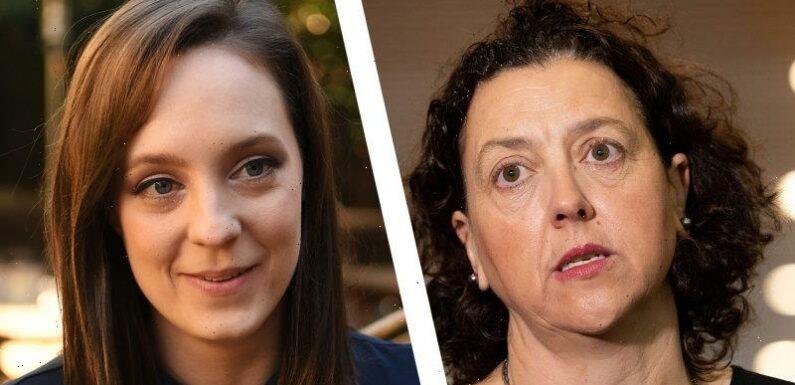
A dispute over activist Sally Rugg’s resignation from her role as teal independent Monique Ryan’s chief of staff in December is at the centre of a high-profile court case between the pair as the staffer sues the new MP over allegations of unreasonable work hours.
Five sources within the teal movement said the pair clashed over their priorities after initially celebrating their union.
Monique Ryan and Sally Rugg are in a legal stoush.Credit:Photos: Alex Ellinghausen/Nick Moir
Rugg, the former Change.org head, is trying to stop Ryan, the climate and integrity campaigner who rolled former Liberal treasurer Josh Frydenberg in the election on a platform of improving politics, from firing her following a dispute about working hours.
The Federal Court case lodged against Ryan and the Commonwealth – Rugg’s technical employer – has reignited debate within the crossbench over the Albanese government’s decision to reduce the number of staff allocated to independent MPs.
Rugg claims in court documents she was denied her workplace right of refusing “to work additional hours that were unreasonable” resulting in the Commonwealth “engaging in hostile conduct in the workplace”.
She wants a court to find the Commonwealth breached the Fair Work Act by dismissing her, effective from January 31, because she “exercised a workplace right, being to make complaints and inquiries in relation to her employment”.
Rugg – who is represented by high-profile Labor-aligned employment lawyer Josh Bornstein – alleges in the documents that Ryan was the “principal actor” in the above allegations, and is calling for an injunction to stop Ryan terminating her employment.
She is still employed pending a court hearing on Friday.
Multiple sources have confirmed Rugg resigned from her position over Christmas. However, a key point of the court dispute will be over the circumstances of her resignation, with sources close to the matter saying she was pressured.
Associates believed the split was amicable and involved Rugg working until January 31. They were taken by surprise when Rugg filed her application in court.
Ryan declined to comment when asked if Rugg was pressured to resign.
While MPs’ staffers work for them, their employment is technically under the Department of Finance.
Rugg’s lawyers, from the firm Maurice Blackburn, declined to comment, but confirmed she was still employed by Ryan.
This masthead spoke to five sources involved in the teal movement with direct knowledge of the workplace troubles surrounding the pair. They described a mismatch of priorities between Ryan (and her campaign staff) and Rugg, who joined the office after the election.
The Kooyong MP’s office announced on Friday the hiring of a new community organiser and emailed constituents about “re-engag[ing] the Kooyong volunteer base”.
Sources said Rugg sometimes took several days off after parliamentary sitting weeks. Sources close to Rugg says she fulfilled the requirements of her contract.
One source familiar with Ryan’s office said staff hired by the major parties were often able to be moved to various roles within the organisations.
“Independents don’t have the same system,” said the source, who spoke on background because the matter was before the courts, adding that this was a rare example of both the MP and staffer having a public profile.
Supporters of Teal independent Monique Ryan at the Auburn Hotel during the election campaign. Credit:Joe Armao
According to the Fair Work Act, employees may refuse to work unreasonable hours based on a number of factors, including their health, personal circumstances, the usual requirements and patterns of work in the industry and the employee’s level of responsibility.
Rugg also invoked the enterprise agreement for MPs’ staff, which sets out the parameters of ordinary and additional working hours.
The agreement also says the level of payment provided to politicians’ electorate and personal staff, including allowances and other benefits, reflects an expectation they will be regularly required to work more than a standard week.
The case has been launched against the backdrop of the Albanese government last year slashing the staff allocation for independent MPs from four to one, over which Ryan accused Labor of attacking the crossbench.
“This measure is aimed at decreasing the effectiveness of the community independents in particular,” she said in June.
Parliament House also drew increased focus on its own workplace practices and treatment of politicians’ staff after the release of Sex Discrimination Commissioner Kate Jenkins’ Set the Standard report in late 2021, and other high-profile allegations regarding parliamentary culture.
A review published by the Department of Prime Minister and Cabinet in October recommended politicians’ ability to terminate their staff should be limited, which the government accepted in principle.
Various submissions to the review complained about the long hours parliamentary staffers endured. One anonymous staffer said one there were “unrealistic” expectations of having to be available all hours.
“The ‘reasonable hours’ are not defined and are therefore left for interpretation (and in some cases, abuse),” the submission said. There is no suggestion this has occurred in the current case.
Ryan told The Australian in October she was considering fundraising for extra staff as some staff were working more than 70 hours a week.
“It’s not healthy. I think it’s only a matter of time before we have a poor outcome with one of our staff members,” she said.
Cut through the noise of federal politics with news, views and expert analysis from Jacqueline Maley. Subscribers can sign up to our weekly Inside Politics newsletter here.
Most Viewed in Politics
From our partners
Source: Read Full Article

